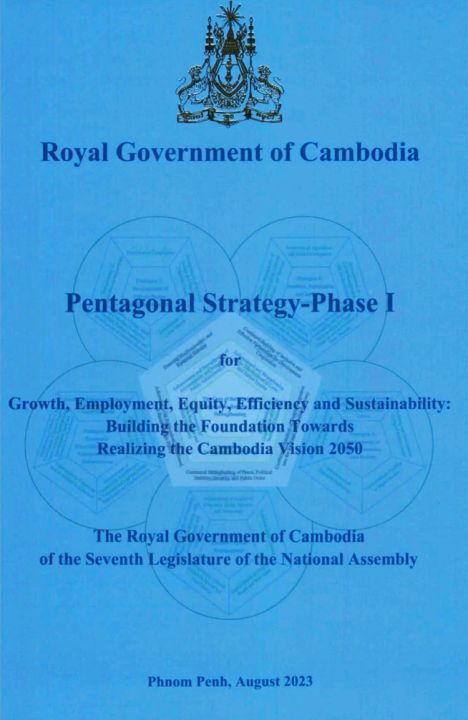The Win-Win policy implemented by Samdech Akka Moha Sena Padei Techo Hun Sen has significantly contributed to Cambodia’s peace, national unity and territorial integrity over the past 25 years. The Royal Government of Cambodia (RGC) has effectively implemented the Triangular Strategy and the Four-Phase Rectangular Strategy to steer commendable progress in the political, social and economic domains. The Royal Kingdom of Cambodia is an independent, sovereign state that is peaceful, based on the rule of law and politically stable.
The country is now fully integrated into regional and global frameworks, vital in maintaining regional and international order and safeguarding world peace. Millions of Cambodians have been lifted from poverty, enjoying improved livelihoods, better education, enhanced welfare and increased life expectancy. The country’s economic landscape has changed from traditional agriculture to a solid and diversified economic base, hosting high-value industries.
The Royal Kingdom Cambodia enjoys financial independence and the ability to determine its future. The country and RGC has taken great strides in politics, security, social order and socio-economic development amid dynamic political landscapes and challenges, such as the public health crisis, global geopolitical conflict, economic uncertainty and natural disasters.
Strategic Opportunities and Economic Diversification
There are significant opportunities which shall shape the future of Cambodia and most are in the global context. Important strategic areas are hence focused on strengthening peaceful co-existence and neutral investment focused diplomacy with a need to diversify the economy. Thus, the shift of the center of economic growth towards Asia opens up a golden opportunity for Cambodia to further the development process, develop and industrialize and diversify the economy, increase production and simultaneously intensify economic integration with its dynamic regional partners. The highest priority is assigned to the preservation of peace and political stability, which accelerates the pace of socio-economic development, supports macroeconomic stability and fosters private investment and business development.
Building financial systems, banking and non-banking into robust systems will ultimately bring additional opportunities for meeting national demand with the support of economic and monetary integration in the region. The transformation of digital financial services is further expected to enhance the implementation of policies on the digital economy, economic efficiency and financial inclusion.
Building the capacity of domestic support industries will have increased opportunities for value addition, efficiency, productivity and competitiveness. Technological advances and digitalization offer new opportunities for employment and business development, ultimately leading to the creation of a digital economy and digital society in Cambodia.
A Vision for the Future: The Pentagonal Strategy
The Pentagonal Strategy is a long-term socio-economic blueprint that will be put in place over the next 25 years. It is expected to encompass issues related to institutional reforms a conducive environment for strategy implementation and strategic pentagons to kick-start economic growth and social development.
The strategy comprises Six Priority Policy Programs of the Political Platform of the Royal Government of the Seventh Legislature of the National Assembly. The Five Strategic Pentagons pivot around human capital development, economic diversification and competitiveness enhancement.
Key priorities include:
- They are improving the quality of education, sports, science and technology.
- Technical skills training.
- Enhanced health and well-being.
- Improved social protection and food systems.
- Developed a highly civilized society of good morality, fairness, and equal participation.
Sustained growth is built upon a diversified and competitive economy.
RGC priorities include:
- Developing major sectors and new sources of economic growth;
- Improved connectivity and efficiency in transport, logistics, energy, water supply, and digital;
- Raise the quality of the business and investment environment;
- Strengthen the efficiency and attractiveness of Special Economic Zones.
- Innovation of financing mechanisms and financial products to facilitate the needed investment.
Implementation and Monitoring Commitment
The RGC is highly committed to the execution of the Pentagonal Strategy with confidence and ownership using mechanisms for quickening, coordination and monitoring implementation. These mechanisms include the utilization of existing organizational structure, mobilizing resources, disseminating information, formulating action plans and key performance indicators including a healthy budget plan in a manner that corresponds to measures defined in the RGC policy.
Coordination mechanisms are intended to be dynamic with key focus on leadership and planning the design and implementation of measures responsive to changes in circumstances.
Some of the mechanisms planned are:
Lead and coordinate in formulating action plans and updating progress reports, as well as monitoring, control, and evaluation of the Pentagonal Strategy.
Setting up an inter-ministerial committee or council for the implementation of inter-ministerial, inter-institutional, or cross-sectoral priorities. Ministerial institutions will involve stakeholders at all levels in the planning, implementing, and monitoring progress in evaluation efforts with a proactive, good governance approach.
Regular capacity building to be provided for officials involved with implementing the strategies and providing feedback from government agencies, development partners, the private sector and the public.
Monitoring and evaluation mechanisms shall be instituted for guiding and refining policy measures and the implementation process. Each ministry and institution should develop and implement an internal monitoring and evaluation program that will create a dialogue, deal with the challenges in achieving goals, set the means of carrying out corrections, track the progress of an intended objective, and set straightforward measuring methods.



